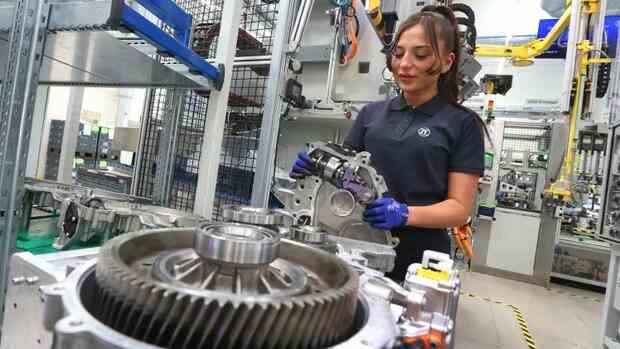The business with components for electric cars is growing.
Stuttgart Auto parts suppliers’ returns are coming under increasing pressure. This can also be seen in the figures from the second largest German supplier, ZF. Adjusted operating profit increased slightly in the past financial year to 2.04 billion euros. At 376 million euros, earnings after taxes were hardly half as high as in 2021 – despite sales growth of 14 percent to 43.8 billion euros.
But a third of this increase is due to currency effects. With an EBIT margin of 4.7 percent, ZF should still be more profitable than its big competitor Bosch. The business of the major customers, the German car manufacturers, is developing better – above all the record results from BMW and Mercedes. The suppliers face difficult times.
“Even though we made further progress with our strategy in 2022, we cannot be satisfied with this financial result,” said ZF CEO Holger Klein at the balance sheet presentation in Friedrichshafen. The manager, who took over the top position at the beginning of January, wants to make the company more efficient with a “performance program”.
In addition, the company intends to make targeted investments in high-yield, forward-looking technologies. The order backlog for e-drives already amounts to more than 30 billion euros, ZF announced. That’s an increase of more than five billion from last reported.
Structurally, the foundation company wants to reposition itself: The supplier wants to merge the car chassis technology and active safety technology divisions. A new division for chassis, steering and brake technology is planned. “With sales of more than 14 billion euros, the new division offers all the hardware, software and electronics needed to control a vehicle’s vertical, longitudinal and lateral dynamics,” explained Klein.
Free cash flow at ZF almost halved
ZF wants to separate completely from some divisions with a total turnover of several billion euros or look for new partners. These include the passive safety technology division, the conventional car axle business and the business with autonomous shuttles. The spin-offs from the foundation group are already being prepared, but are likely to take a few more months.
>> Also read: Bosch in patent applications BMW and ZF
ZF’s free cash flow adjusted for M&A activities, which almost halved to 544 million euros, shows how strong the pressure on the industry is. The reason for this is, among other things, the high costs of building up inventories, which the suppliers use to compensate for problems in the automotive supply chain. At the end of last year, net liabilities amounted to 10.4 (2021: 10.1) billion euros.
The high burdens from the billion-dollar takeovers of TRW and the brake manufacturer Wabco continue to weigh on the balance sheet. The turnaround in interest rates is therefore considered a major challenge for ZF in future debt refinancing. However, the company’s equity ratio is now back above the 20 percent mark. The planned sales should also bring relief from the debt.
As a result of the corona pandemic and the outbreak of the war in Ukraine, car production has shrunk since 2019. While manufacturers are compensating for the kink by focusing on high-priced products, suppliers’ businesses remain complicated. Nevertheless, the foundation group ZF expects slightly better business this year. Sales are expected to increase to over 45 billion euros, the adjusted EBIT margin is expected to be between 4.7 and 5.2 percent.
More: VW wants to increasingly manufacture components for the electric drive itself. With this, VW is pushing into a billion-dollar market of suppliers
